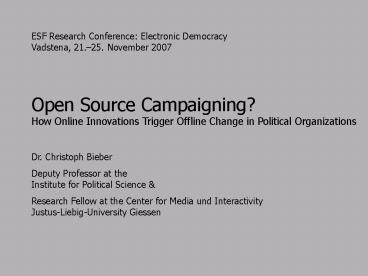Open Source Campaigning PowerPoint PPT Presentation
1 / 7
Title: Open Source Campaigning
1
ESF Research Conference Electronic Democracy
Vadstena, 21.25. November 2007 Open Source
Campaigning?How Online Innovations Trigger
Offline Change in Political Organizations Dr.
Christoph Bieber Deputy Professor at
theInstitute for Political Science Research
Fellow at the Center for Media und
InteractivityJustus-Liebig-University Giessen
2
Summary I
Citizen media, voter-generated content and
online-volunteering have become a standard in
modern election campaigns, not only in the US
mid-terms 2006. German Bundestagswahl 2005 and
french Présidentielle 2007 included a strong use
of online-recruitment and team-building systems
to guarantee the participation of citizens
outside legal party structures. To a large
extent, campaigns try to establish a partisan
discussion of the main political issues not only
in tech-based, blog- or wiki-focused
online-applications but as a general mode of
debate within the changing party and campaign
structures.
3
Summary II
The contribution argues, that the experienced use
of tools and platforms for political
online-discussions has lead to a new mode of
campaigning similar to the model of creating
"Open Source"-software. Election campaigns are no
longer developed and conducted by only a small
number of professional consultants in close
connection to party leaders and candidates, but
have to recognize numerous voices in the
blogosphere and online-communities such as
Flickr, MySpace, YouTube or Second Life. Thus
campaign officials are facing new challenges
the process of opening up for inputs from
supporters outside the party structures may lead
to a significant lack of control when
communicating campaign issues or candidate
profiles.
4
Research Challenges - Theories
The Discussion on Electronic Democracy at least
in german political science stills seems to be
theory-biased (ED as a concept for
re-invigorating democracy, ED as modern political
theory). Since the first explorative studies on
ED from the mid-nineties, there were only few
attempts to conduct mixed-method approaches
(empirical ED). Recent publications still refer
to the basic works of the first period of
Internet Research, claiming a large gap between
the theoretical framework of E-Democracy and the
empirical reality of political communication
online. Additionally, the biggest part of
research based in Social Sciences doesnt keep up
with the latest developments online many
publications are only echoing an online
situation which already has evolved widely.
5
Research Challenges - Methods
Considering E-Campaigns theres a serious lack of
standar-dized methods to describe and analyze the
various elements of digital campaign activity.
While the number of research projects covering
the efforts of political actors in digital
election campaigns is constantly growing
(accompanied by studies from media studies or
communication science), quantitative studies are
outnumbering those with a qualitative
background. Especially theres no framework
recognizing the rising importance of
(audio-)visual elements of campaign communication
(i.e. digital imaging, animations and web-video).
This lack of methodical standards also hinders
the examination of complex online-environments
like Massive-Multi-Player-Environments (i.e.
Second Life).
6
Research Challenges Methods/Theories
In perspective, digital political processes will
also take place between human and non-human
communicators i.e. research on the
communication process during the use of an
electronic voting machine will have to consider
and model such human/machine-settings. Especially
disciplines with a rather classical Social
Science-background thus might be strongly
challenged by the technological developments
within interconnected media systems and
networks. To sum up, the text-based methods (and
theories) dominating research within the Social
Sciences will have to be revised and updated by
integrating multi-mode-perspectives, that also
focus on audio-visual elements and are open for
technical extensions of the political realm.
7
Dr. Christoph Bieber Deputy Professor at
theInstitute for Political ScienceJustus-Liebig-
Universitaet of GiessenKarl-Gloeckner-Str.
21e 35394 GiessenGermany Web
http//www.uni-giessen.de/fb03/politikBlog
http//internetundpolitik.wordpress.com

